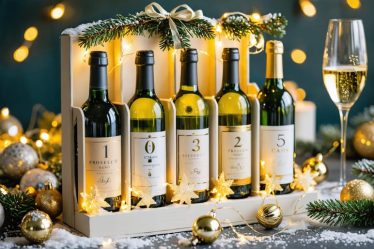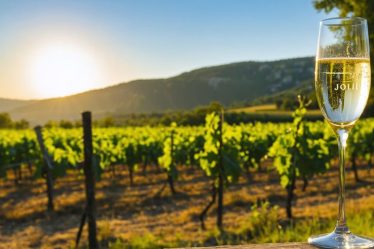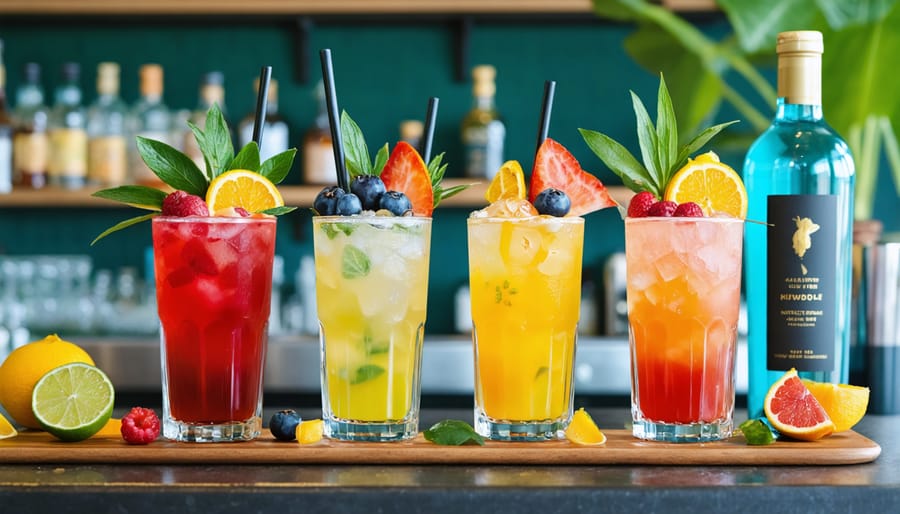
The non-alcoholic beverage landscape is experiencing a revolutionary shift, driven by health-conscious consumers seeking refreshing non-alcoholic alternatives that don’t compromise on taste or social experience. With the global market projected to reach $1.7 trillion by 2027, this once-niche segment has transformed into a powerful force reshaping our drinking culture. From innovative functional beverages packed with adaptogens to sophisticated mocktails that rival their spirited counterparts, consumers are embracing a new era of mindful drinking that prioritizes wellness without sacrificing enjoyment.
The surge in plant-based options, functional beverages, and premium ready-to-drink alternatives reflects a broader cultural shift toward more conscious consumption. As Millennials and Gen Z lead the “sober curious” movement, beverage manufacturers are responding with unprecedented creativity, introducing complex flavor profiles and sustainable packaging solutions that appeal to both occasional and committed non-alcoholic drinkers alike. This dynamic market evolution isn’t just about abstaining from alcohol – it’s about reimagining how we celebrate, socialize, and enhance our daily rituals through sophisticated, health-forward beverage choices.
The Wellness Revolution Driving Non-Alcoholic Innovation
Social Sobriety Movement
The rise of the social sobriety movement marks a fascinating shift in our relationship with alcohol. More people, especially millennials and Gen Z, are embracing a changing drinking culture that prioritizes mindful consumption and overall wellness. This isn’t just about abstaining from alcohol; it’s about creating new social norms and experiences that don’t revolve around drinking.
The “sober curious” movement has gained tremendous momentum, with many exploring periods of sobriety through challenges like Dry January or Sober October. Social media has played a crucial role, with influencers and wellness advocates sharing their alcohol-free journeys and normalizing the choice not to drink. Communities are forming around this lifestyle, with sober bars, alcohol-free social events, and dedicated online spaces becoming increasingly popular.
What’s particularly striking is how this movement has transformed from a niche trend into a mainstream lifestyle choice. People are discovering that they can maintain vibrant social lives, celebrate special occasions, and unwind after work without alcohol, leading to a more conscious and intentional approach to socializing and self-care.
Health-Forward Ingredients
Gone are the days when non-alcoholic beverages were limited to sugary sodas and basic juices. Today’s health-conscious consumers are driving a revolution in functional ingredients that not only taste great but also deliver impressive wellness benefits. I’ve noticed adaptogenic mushrooms like reishi and lion’s mane popping up in everything from sparkling waters to coffee alternatives, helping us manage stress and boost focus naturally.
Prebiotics and probiotics are making a splash too, with kombucha leading the charge and new fermented beverages following suit. Plant-based proteins, particularly pea and hemp, are finding their way into ready-to-drink beverages, perfect for those post-workout moments. One of my favorite developments is the integration of nootropics – think L-theanine and ashwagandha – designed to enhance mental clarity without the jitters of caffeine.
Botanical extracts like elderberry, hibiscus, and turmeric aren’t just adding natural color and flavor; they’re bringing their antioxidant properties to the table. And let’s not forget about CBD-infused drinks, which continue to gain traction for their relaxation benefits, though regulations vary by region.
Craft Non-Alcoholic Beverages Taking Center Stage
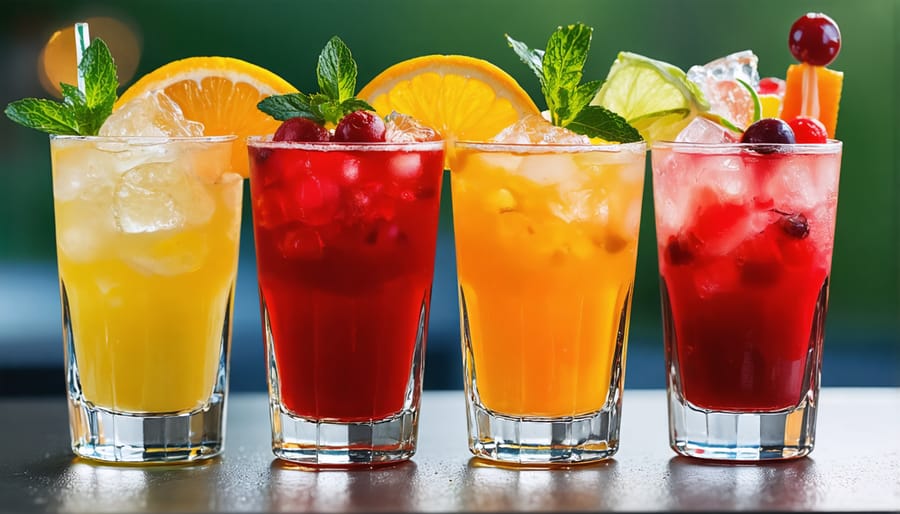
Zero-Proof Cocktails
Gone are the days when skipping alcohol meant settling for plain soda or juice. Today’s sophisticated mocktail trends are revolutionizing how we think about zero-proof beverages. As someone who loves hosting dinner parties, I’ve noticed how my guests’ eyes light up when I serve them carefully crafted alcohol-free cocktails that look and taste just as exciting as their spirited counterparts.
Craft mixologists are pushing boundaries with botanical-infused bases, house-made syrups, and innovative techniques that deliver complex flavor profiles. Think smoky cedar-infused apple juice, lavender-honey sparklers, and spiced vanilla “whiskey” alternatives that bring warmth and depth to drinks without the alcohol.
Premium ready-to-drink mocktails are also gaining momentum, with brands focusing on natural ingredients and sophisticated flavor combinations. These beverages often incorporate adaptogens, nootropics, and functional ingredients that not only taste great but offer additional wellness benefits.
The rise of dedicated alcohol-free bars and “mindful drinking” spaces shows just how far this movement has come. These venues are creating inclusive social environments where everyone can enjoy the ritual and sophistication of cocktail culture, regardless of their drinking preferences. The best part? You can recreate these experiences at home with an ever-growing selection of non-alcoholic spirits, bitters, and mixers available at specialty retailers and online shops.
Botanical-Based Beverages
Gone are the days when herbal tea was the only botanical beverage option! I’ve been amazed to watch the explosion of sophisticated plant-based drinks transforming our beverage aisles. From lavender-infused sparkling waters to adaptogenic elixirs, botanical beverages are blooming everywhere – and for good reason.
These nature-inspired drinks aren’t just Instagram-worthy; they’re answering our collective call for beverages that do more than just quench thirst. I’ve noticed more of my friends reaching for drinks infused with elderflower, rose, and hibiscus, not just for their delightful flavors but also for their potential wellness benefits.
What’s really exciting is how beverage makers are combining traditional botanical wisdom with modern innovation. Think cucumber-mint seltzers enhanced with ashwagandha, or rosemary-infused coconut water with added adaptogens. Many of these drinks feature clean, minimalist ingredient lists that align perfectly with today’s health-conscious consumers.
The industry is seeing particular growth in functional botanicals like tulsi (holy basil), moringa, and dandelion root. These ingredients aren’t just trendy – they’re part of a larger movement toward more mindful consumption. As someone who’s always looking for natural alternatives to sugary drinks, I’m thrilled to see these options becoming more accessible and delicious.
What makes this trend especially exciting is its versatility – botanical beverages work beautifully for both everyday refreshment and as sophisticated alternatives to cocktails.
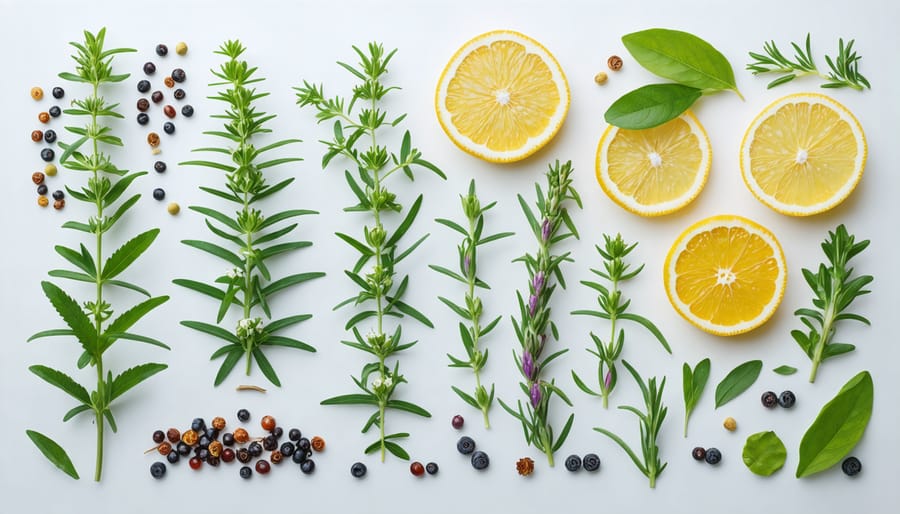
Sustainability and Packaging Innovation
As someone who’s been watching the beverage industry evolve, I’m thrilled to see how sustainability has become more than just a buzzword. The latest wave of sustainable beverage practices is transforming how our favorite drinks are packaged and delivered to our tables.
Remember those bulky plastic bottles we used to grab without a second thought? They’re gradually being replaced by innovative alternatives that make me feel better about my daily hydration choices. Companies are now experimenting with plant-based bottles, made from materials like corn starch and sugarcane, which break down naturally without harming our environment.
What’s really catching my eye is the rise of aluminum cans. They’re not just for sodas anymore! Premium waters, craft kombuchas, and botanical drinks are embracing this infinitely recyclable packaging option. Plus, have you noticed how sleek and Instagram-worthy these new designs are? It’s like carrying a little piece of art in your hand.
But it’s not just about looking good – brands are getting creative with their packaging solutions. Some companies are introducing concentrated drink pods that you can mix with water at home, dramatically reducing shipping emissions and packaging waste. Others are pioneering edible packaging materials or revolutionary water-soluble labels.
My favorite development has to be the emergence of refill stations in grocery stores. Just bring your own bottle, and you can fill up on everything from sparkling water to probiotic drinks. It reminds me of those charming European water fountains, but with a modern, eco-conscious twist.
The industry is also tackling the issue of plastic rings and shrink wrap, replacing them with biodegradable alternatives or innovative packaging designs that eliminate the need for additional materials altogether. It’s inspiring to see how these changes are making it easier for all of us to make more environmentally conscious choices without sacrificing convenience or style.
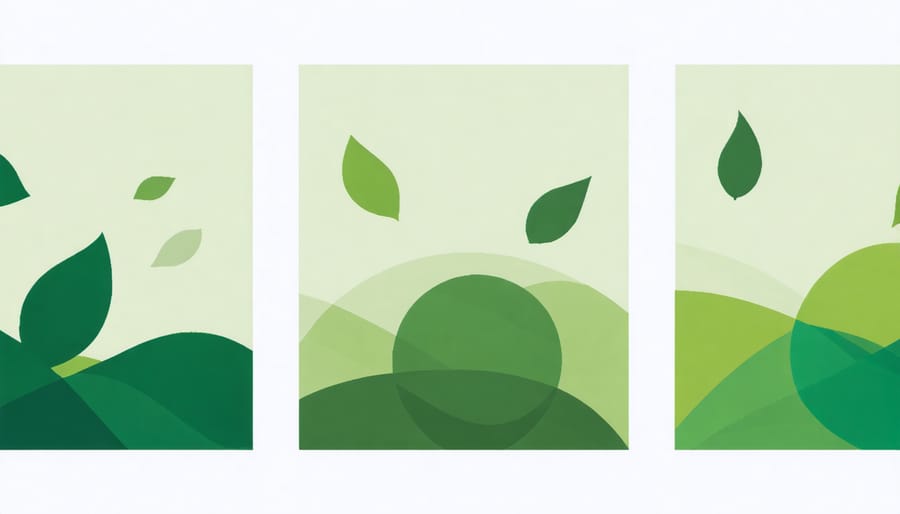
What’s Next for Non-Alcoholic Beverages
As someone who’s been watching this space evolve, I can tell you that the future of non-alcoholic beverages looks incredibly exciting! The next few years are set to bring even more innovation and creativity to our glasses.
One of the most promising developments is the rise of functional beverages with adaptogenic ingredients. Think drinks infused with mushrooms, herbs, and botanicals that not only taste amazing but also support our wellbeing. I’ve noticed more brands experimenting with ingredients like ashwagandha and rhodiola, which help manage stress and boost energy naturally.
Sustainability is becoming non-negotiable. Many of us are already choosing brands that prioritize eco-friendly packaging, and this trend will only grow stronger. We’ll see more companies embracing biodegradable materials and reducing water waste in their production processes. Some innovative brands are even exploring carbon-neutral manufacturing!
Technology is also revolutionizing how we enjoy our drinks. Smart vending machines that can customize beverages on the spot and subscription services that learn your taste preferences are just the beginning. I’m particularly excited about the emergence of AI-powered mixing systems that can create perfectly balanced mocktails at home.
The mocktail movement is evolving too, with sophisticated alternatives that rival traditional cocktails in complexity and presentation. Expect to see more zero-proof spirits that perfectly mimic the taste and mouthfeel of alcohol, along with creative botanical blends that offer unique flavor profiles we haven’t experienced before.
Health-conscious options will continue to expand, with a focus on gut health and immunity support. Probiotic drinks, fermented beverages, and naturally sweetened options will become more prevalent. We’re also likely to see more personalized nutrition options, with drinks tailored to specific dietary needs and wellness goals.
Remember when sparkling water was considered boring? Those days are long gone, and the future promises even more excitement in the non-alcoholic beverage world!
The non-alcoholic beverage landscape is evolving in exciting ways, offering more choices than ever for those seeking flavorful alternatives to traditional drinks. From sophisticated botanical-infused beverages to functional wellness drinks, the industry is responding to our growing desire for mindful consumption without compromising on taste or experience.
As we’ve explored, key trends like premium craft mocktails, adaptogenic drinks, and sustainable packaging are reshaping how we think about alcohol-free options. The rise of social sobriety and health-conscious consumers has created a vibrant community of individuals who celebrate choice and inclusivity in their drinking habits.
Whether you’re sober-curious, taking a break from alcohol, or simply looking to expand your beverage horizons, there’s never been a better time to explore the world of non-alcoholic drinks. The innovation in this space shows no signs of slowing down, with new brands and products launching regularly to meet diverse consumer preferences and lifestyle choices.
I encourage you to experiment with these trending options – you might just discover your new favorite drink while being part of this transformative movement in beverage consumption.


